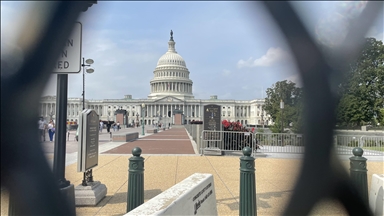WASHINGTON (AA): Former President Donald Trump cannot claim immunity from a lawsuit brought by law enforcement officers injured during the Jan. 6, 2021 Capitol riot and Democratic lawmakers, the Justice Department said Thursday.
The department’s filing comes after the US Court of Appeals for the District of Columbia Circuit asked the agency to weigh in on the matter.
Trump had sought to claim “absolute immunity” in the case, but Justice Department attorneys who filed the court brief wrote that while presidents generally enjoy great leeway with their legal protections “it is not a rule of absolute immunity for the President regardless of the nature of his acts”
A lower court ruled in favor of the plantiffs, which include Democratic Representative Eric Swalwell, other House Democrats, and Officers James Blassingame and Sidney Hemby.
US District Judge Amit Mehta ruled in February 2022 that the plantiffs “have plausibly established” that Trump’s impassioned address to his supporters in the hours before they stormed the federal legislature led to the ensuing violence, denying Trump’s motion to dismiss the case and prompting the ex-president to appeal.
During the conclusion of the address near the White House, Trump told his supporters to “fight like hell, and if you don’t fight like hell, you’re not going to have a country anymore.”
Trump gathered his supporters in the nation’s capital in a bid to prevent lawmakers from carrying out a constitutionally-mandated step ahead of US President Joe Biden’s inauguration.
The violence that followed Trump’s speech was historic. His loyalists overran barricades, violently clashed with police, broke through the Capitol’s doors and windows, and occupied the legislature’s chambers and offices as lawmakers fled and were placed in lockdown.
The attorneys did not weigh in on the merits of the case, but said “no part of a President’s official responsibilities includes the incitement of imminent private violence.”
“By definition, such conduct plainly falls outside the President’s constitutional and statutory duties,” they wrote. “The district court’s denial of absolute immunity should be affirmed.”
Still, they emphasized that any ruling coming from the appeals court should be narrowly tailored to ensure it does not “comprehensively define the boundaries of the President’s immunity for his speech on matters of public concern—including when and how to draw a line between the President’s official and electoral speech.”
“Those are sensitive questions of fundamental importance to the Executive Branch, and this unusual case would be a poor vehicle for resolving them,” they wrote.







